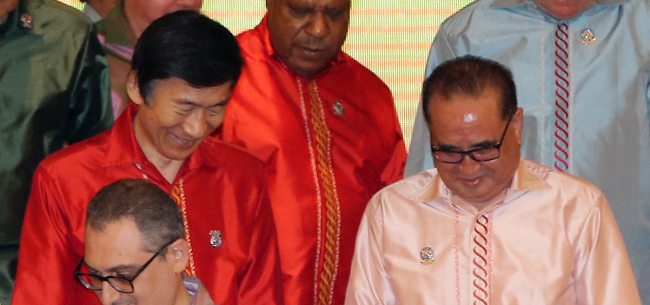NAYPYITAW (Yonhap) ― The top diplomats of South Korea and the U.S. agreed to continue to closely cooperate on curbing North Korea’s nuclear weapons program during their one-on-one meeting in Myanmar Saturday, Seoul officials said.
South Korean Foreign Minister Yun Byung-se and U.S. Secretary of State John Kerry were in Myanmar for an annual security forum hosted by the Association of Southeast Asian Nations, dubbed the ASEAN Regional Forum.
“The two ministers agreed to continue to cooperate in making practical advances for North Korea’s denuclearization,” said an official at Seoul’s Foreign Ministry.
The meeting came amid heightened tension on the Korean Peninsula over the North’s firing of a series of short-range missiles and rockets in recent weeks. Pyongyang even threatened a fourth nuclear test.
 |
South Korean Foreign Minister Yun Byung-se (left) talks with North Korean Foreign Minister Ri Su-yong after a photo session during a gala dinner of the 47th Association of the Southeast Asian Nations Foreign Ministers’ Meeting in Naypyitaw, Myanmar, Saturday. (Yonhap) |
The six-party talks aimed at curbing the North’s nuke ambitions have been dormant since late 2008 when Pyongyang walked out of the negotiations. The talks involve the two Koreas, the United States, China, Russia and Japan.
North Korea has called for an “unconditional” resumption of the six-party talks, but Seoul and Washington insist that Pyongyang should first take concrete steps toward denuclearization.
When Kerry visited Seoul in February, he said that Washington would not hold talks with Pyongyang until the communist country was ready to negotiate for verifiable denuclearization.
The U.S. State Department spokesman, Jen Psaki, said in Washington earlier this week that Kerry has no plan to meet one-on-one with his counterpart from North Korea, Ri Su-yong, on the sidelines of the ARF.
The foreign ministers of South Korea, the United States and Japan plan to hold three-party talks on Sunday morning to discuss mainly North Korea, according to Seoul officials.
Meanwhile, South Korea has pledged to pursue a “pragmatic cooperation” with China over Beijing’s push to set up a new regional bank to fund infrastructure projects in Asia, China’s Foreign Ministry said Saturday, in what appeared to be Seoul’s most positive move to date on the issue.
South Korean Foreign Minister Yun made the pledge when he met with his Chinese counterpart, Wang Yi, on Friday on the sidelines of a regional security dialogue in Naypyitaw, the Chinese ministry said in a statement.
China has been preparing to set up the Asia Infrastructure Investment Bank as a counterbalance to the Asian Development Bank led by the U.S. and Japan, and has asked countries in the region, including South Korea, to join the drive. The U.S. has been negative about the Chinese plan.
Chinese President Xi Jinping officially asked South Korea to join the Asia infrastructure bank during his visit to Seoul earlier last month, but South Korea’s stance remains unclear.
During the Friday talks, Yun told Wang that the two nations “should maintain high-level exchanges, push forward pragmatic cooperation and maintain communications on China-ROK FTA negotiations and the establishment of the Asia Infrastructure Investment Bank,” the Chinese ministry said in a statement.
Wang said South Korea and China must work together to conclude their free trade talks by the end of this year and “maintain communications on the Asia Infrastructure Investment Bank,” according to the statement.
South Korea and its biggest trading partner began their formal free trade negotiations in May 2012.
Agriculture and fisheries are considered the most sensitive sectors for South Korea, while China categorizes its manufacturing industries, which include the automobile, machinery and oil sectors, as sensitive.
The two nations have held 12 rounds of free trade negotiations so far, but no big progress has been made due to a range of issues, including who should make more concessions in tariff removal for their respective areas of interest ― agricultural and industrial goods.








![[Weekender] Korea's traditional sauce culture gains global recognition](http://res.heraldm.com/phpwas/restmb_idxmake.php?idx=644&simg=/content/image/2024/11/21/20241121050153_0.jpg)